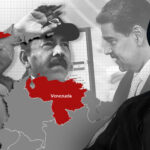PSUV Deputy Diógenes Linares addressing the Venezuelan National Assembly in the session that approved the Pension Protection Law Against the Imperialist Blockade, in Caracas on May 8, 2024. Photo: Venezuelan National Assembly.
The National Assembly of Venezuela has unanimously approved the Law for the Protection of Social Security Pensions against the Imperialist Blockade, in its second discussion. Private companies must now make a special contribution of up to 15% extra to the total payments made to their workers for salaries and non-salary bonuses towards this pension fund.
The law, passed this Tuesday, May 7, established the amount of the special contribution that private legal entities—whether or not based within Venezuela—that carry out economic activities in the national territory must make. Since President Maduro announced the idea of the project during the massive May Day march in Caracas, government officials have been in negotiations with the business sector and with grassroots pensioner organizations to reach a consensus on the percentage to be collected in the new fund, which aims at improving the deteriorated salary and labor conditions of millions of Venezuelans as a direct consequence of illegal and unilateral sanctions imposed by the US and the European Union.
Among the fundamental aspects of the law, it stands out that default interest may be generated for non-payment of the special contribution within the established time-frame. In this case, by operation of law and without the need for a prior request from the Tax Administration, the obligation arises for these companies to cancel this interest, in accordance with the provisions of the Constituent Decree through which the Organic Tax Code is dictated.
The legal regulations also establish that the president may exempt special taxpayers and strategic sectors for foreign investment and national development from payment of the special contribution provided for in the law, either totally or partially.
The collection of the special contribution through the National Integrated Customs and Tax Administration Service (Seniat) is also provided for in the law, which will be declared and paid monthly.
It is established that the declaration and payment of the special contribution must be made in the place, form, and conditions established by the Seniat, through a general administrative ruling. The special contribution provided for in the law will be deductible from the expense for the calculation of income tax.
Finally, private legal entities that do not comply with the provisions of the law will be subject to sanctions in accordance with the Constituent Decree through which the Organic Tax Code is dictated. It is expected that in the coming days, this will be elaborated on by President Nicolás Maduro and officially announced.
May Day: President Maduro Announces Comprehensive Minimum Wage Raise of 30%
During the National Assembly’s ordinary session, its president, Jorge Rodríguez, recalled that this Law was an initiative of the President Maduro to assist the victims of US imperialism. “[This is a] healing law initiative,” he said, “a law initiative to care for those who were most beaten and attacked by the predatory, brutal, scoundrel, and criminal action of North American imperialism by imposing illegal sanctions against all the people of Venezuela.”
Rodríguez noted that the economic recovery underway has been an arduous process. “That is why we take very seriously the request made by the president to approve this law so that the private sector, which has also been assisted in this recovery process, assumes responsibilities in terms of improving the amount of the pensions paid to the elderly.”
In accordance with the provisions of Article 106 of the internal regulations on debates of the National Assembly, the deputy for the elderly, Diógenes Linares, presented the text of 13 articles of the project approved on the May 2 draft, and gave a history of the highly deficient pensions system in Venezuela over the 20th century, and compared this situation with the experience lived by pensioners in the 21st century, thanks to the immense achievements built following the arrival and leadership of Commander Hugo Chávez in 1998.
(Alba Ciudad) with Orinoco Tribune content
Translation: Orinoco Tribune
OT/JRE/AU
- May 19, 2024
Share this:
- Click to share on Twitter (Opens in new window)
- Click to share on Facebook (Opens in new window)
- Click to share on LinkedIn (Opens in new window)
- Click to share on WhatsApp (Opens in new window)
- Click to share on Reddit (Opens in new window)
- Click to share on Telegram (Opens in new window)
- Click to email a link to a friend (Opens in new window)






